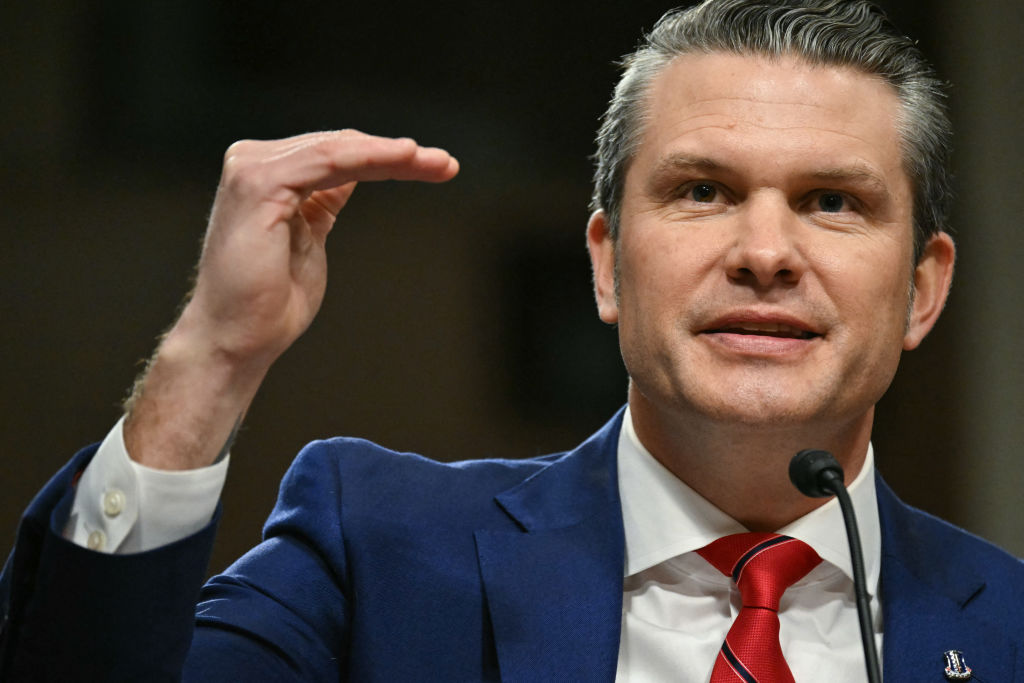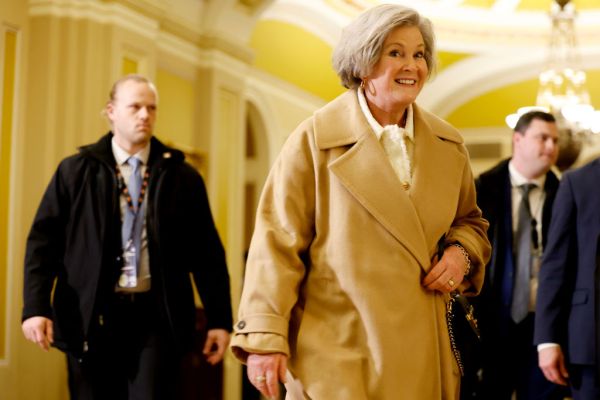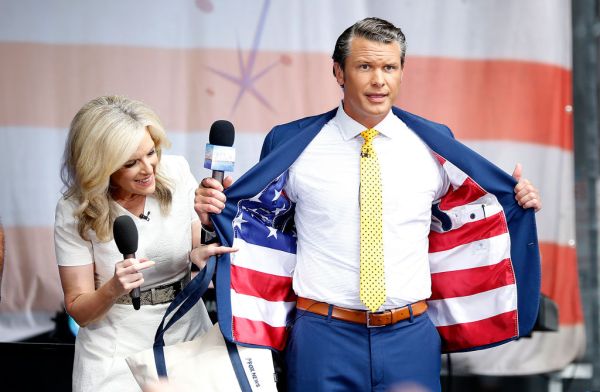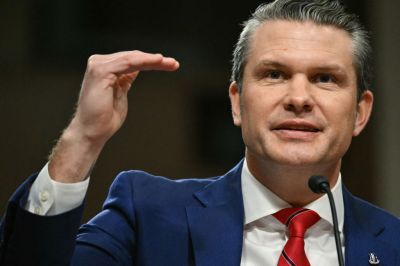Pete Hegseth gave little ground as Democrats on the Senate Armed Services Committee grilled him about his personal character, but his responses to questions about his qualifications to lead the nation’s largest government agency were more revelatory.
During the four-hour hearing Tuesday, President-elect Donald Trump’s nominee to lead the Department of Defense was able to fend off questions about his marital infidelity by arguing he was a changed man and dismiss other serious allegations against him as “anonymous smears.” But he was forced to answer directly as he was asked specific questions about his knowledge of both the policy challenges and more mundane aspects of the Pentagon.
A veteran who ran advocacy organizations for military veterans before becoming a weekend anchor on Fox News, Hegseth focused in the hearing on what he would do to help the everyday soldier. But he was not especially detailed in laying out how he would tackle the big-picture challenges of a department far larger than any organization he has helmed. Committee members were especially interested in the latter, because, during his service in the Army Reserve and National Guard, Hegseth did not rise to a command-level position on the order of such Pentagon leaders as James Mattis and Lloyd Austin.
“I know what I don’t know,” Hegseth, who served in Iraq and Afghanistan, told the committee. “I know I’ve never run an organization of 3 million people with a budget of $850 billion, but what I do know is that I’ve led men and women. I’ve led people, and it’s leadership of people and motivation of people and a clear vision of people, where you build a team, cast that vision, empower people properly. I want smarter and more capable people around me than me, and you will get that at the department.”
Since Trump first announced his nomination, Hegseth has faced criticism that he lacks the necessary qualifications to run an organization as large as the Pentagon. But the president-elect’s team has characterized Hegseth as a “disrupter” who will be buttressed by more experienced staffers to handle the daily duties of running the department. “It’s our obligation to give him people that understand the business of national defense,” incoming White House chief of staff Susie Wiles told the New York Times last week. Just before Christmas Trump announced “a slate of America First Patriots” who have experience in the Department of Defense or other governmental agencies, to work under Hegseth. One such example is Elbridge Colby, the incoming under secretary of defense for policy who served during the first Trump administration as deputy assistant secretary of defense for strategy and force development.
But while staff will execute policy, Hegseth will be the one shaping it and leading negotiations with U.S. military allies on the world stage. Thus Democratic committee members, all but one of whom he did not meet with before the hearing, tried to show that Hegseth lacked the necessary geopolitical and national security acumen—in the hopes of either tanking his nomination or teeing up “I told you so” moments down the road.
Their most successful moment in that effort was when Sen. Tammy Duckworth of Illinois, who lost both her legs while serving in the Iraq War, asked Hegseth to name the number of members in the Association of Southeast Asian Nations (ASEAN), an alliance of 10 nations in the Indo-Pacific region that includes Vietnam, Thailand, and the Philippines and is key to countering Chinese influence there.
“I couldn’t tell you the exact amount of nations in that, but I know we have allies in South Korea and Japan and in AUKUS with Australia,” Hegseth replied. Duckworth interrupted to tell him that none of the countries he named were in ASEAN. Online commentators on the right came to Hegseth’s defense to note that ASEAN is an economic alliance, not a military one. However, the United States has worked with ASEAN on military matters, and secretaries of defense regularly attend its annual defense ministers meeting.
Sen. Tedd Budd of North Carolina, a Republican who sits on the committee, told The Dispatch he was not concerned by Hegseth’s gaffe. “I think he did a fine job,” Budd said. “This wasn’t a time to address flash-card type answers. Those are all important countries, but, again, that’s not the nature of something that can easily be referenced.”
In what appeared to be an attempt to cast doubt on Hegseth’s management skills, Sen. Richard Blumenthal of Connecticut entered into the hearing’s record tax returns of the veterans organizations Hegseth ran—Vets for Freedom and Concerned Veterans for America—that showed repeated budget shortfalls during his leadership.
“I’m extremely proud of the work me and my fellow vets did at Vets for Freedom,” Hegseth replied when asked about the first organization. “A bunch of young vets with no political experience, a small group. … We raised donor funds, and we have letters submitted to the record from almost everyone that worked with me every single day, including our chief operating officer, who will attest that every dollar we raised was used intentionally toward the execution of our mission.” He added that at Concerned Veterans for America, “we used our donor money very intentionally and focused to create policy that better the lives of veterans.”
While most Republicans on the committee sought to give opportunities for Hegseth to shine, he also struggled to answer some questions from GOP members. Sen. Mike Rounds of South Dakota brought up a technical matter about the military’s continued use of the 3.1-3.5 gigahertz band of the electromagnetic spectrum, considered vital to defensive capabilities but which some have proposed be given to telecommunications companies.
“This issue has come up a number of times in meetings. It’s critically important with how our warfighters communicate across all services,” Hegseth said, vowing to receive a classified briefing on the subject in an answer that provided little substance before Rounds interrupted.
But he appeared more comfortable when Budd asked about the commissioning of fighter aircraft to compete with China in the Pacific.
“A lot of it, just to be clear, involves classifications and understanding precisely cost and capabilities, including capabilities of enemy systems, not just fourth- and fifth-, but potential sixth-generation, which we’ve already seen a prototype released from the Chinese. That’s a dangerous development, considering at least the publicly understood condition of NGAD, which I look forward to the opportunity of looking underneath the hood on that,” Hegseth said, referencing a program to build a new fighter jet to be deployed in the 2030s.
Hegseth’s past comments about women serving on the front lines drew plenty of attention, including one he made before he was nominated, in which he was “straight up just saying we should not have women in combat roles.” On Tuesday, he softened his stance. “Every service member, regardless of gender, who can meet objective occupational and readiness standards for a career field should have the opportunity to compete for jobs in that field,” he told the panel, stressing, however, that standards should not be lowered with the goal of bringing more women into combat.
His responses were apparently enough to win over Sen. Joni Ernst of Iowa, a combat veteran and early skeptic who sits on the committee. She announced Tuesday night she would vote to confirm him when the committee meets to decide on recommending Hegseth to the full Senate.
“Our next commander in chief selected Pete Hegseth to serve in this role, and after our conversations, hearing from Iowans, and doing my job as a United States Senator, I will support President Trump’s pick for Secretary of Defense,” she told Fox News.







Please note that we at The Dispatch hold ourselves, our work, and our commenters to a higher standard than other places on the internet. We welcome comments that foster genuine debate or discussion—including comments critical of us or our work—but responses that include ad hominem attacks on fellow Dispatch members or are intended to stoke fear and anger may be moderated.
With your membership, you only have the ability to comment on The Morning Dispatch articles. Consider upgrading to join the conversation everywhere.